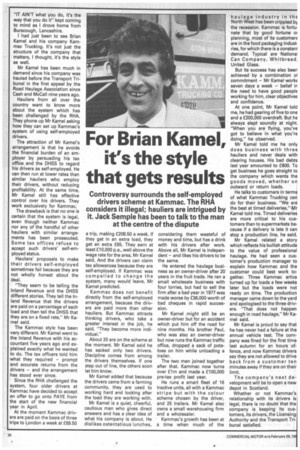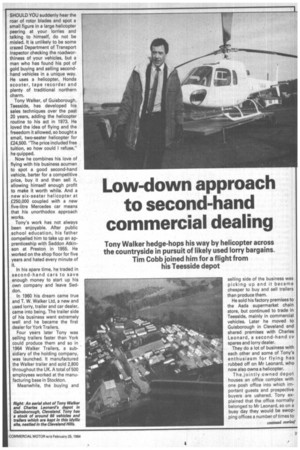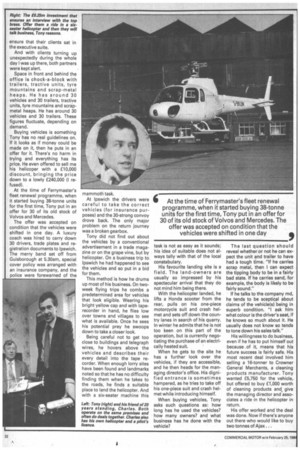For Brian Kamel, it's the style that gets results
Page 32

Page 33

Page 34

If you've noticed an error in this article please click here to report it so we can fix it.
"IT AIN'T what you do, it's the way that you do it" kept coming to mind as I drove home from Burscough, Lancashire.
I had just been to see Brian Kamel and his company Kammac Trucking. It's not just the structure of the company that matters, I thought, it's the style as well.
Mr Kamel has been much in demand since his company was hauled before the Transport Tribunal in the first appeal by the Road Haulage Association since Cash and McCall nine years ago.
Hauliers from all over the country want to know more about the system which has been challenged by the RHA. They phone up Mr Kamel asking how they can set up Kammac's system of using self-employed drivers.
The attraction of Mr Kamel's arrangement is that he avoids the financial burden of an employer by persuading his tax office and the DHSS to regard his drivers as self-employed. He can then run at lower rates than similar hauliers who employ their drivers, without reducing profitability. At the same time, Mr Kamel still has effective control over his drivers. They work exclusively for Kammac.
The drawback is that no one is certain that the system is legal, even though neither Kammac nor any of the handful of other hauliers with similar arrangements has been prosecuted. Some tax offices refuse to accept such drivers' self-employed status.
Hauliers' proposals to make their drivers self-employed sometimes fail because they are not wholly honest about the deal.
"They seem to be telling the Inland Revenue and the DHSS different stories. They tell the Inland Revenue that the drivers are paid on a percentage of each load and then tell the DHSS that they are on a fixed rate," Mr Kamel said.
The Kammac style has been very different. Mr Kamel went to the Inland Revenue with his accountant five years ago and explained exactly what he wanted to do. The tax officers told him what they required — prompt and accurate returns from the drivers — and the arrangement has stood ever since.
Since the RHA challenged the system, four older drivers at Kammac have decided to accept an offer to go onto PAYE from the start of the new financial year in April.
At the moment Kammac drivers are paid on the basis of three trips to London a week at £69.50 a trip, making £208.50 a week. If they get in an extra load, they get an extra £65. They earn at least £10,000 p.a., well above the wage rate for the area, Mr Kamel said. And the drivers can claim tax allowances because they are self-employed. If Kammac was compelled to change the system, many would leave, Mr Kamel predicted.
Kammac does not benefit directly from the self-employed arrangement, because the drivers are paid more than other hauliers. But Kammac attracts thinking drivers, who take a greater interest in the job, he said. "They become more individual."
About 20 are on the scheme at the moment. Mr Kamel said he has sacked only two drivers. Discipline comes from among the drivers themselves. If one step out of line, the others soon let him know.
Mr Kamel added that because the drivers came from a farming community, they are used to working hard and looking after the load they are working with.
Mr Kamel is a quiet, cheerful, cautious man who gives direct answers and has a clear idea of what his company is about. He dislikes ostentatious lunches, considering them wasteful of money and time, but has a drink with his drivers after work. Above all, Mr Kamel is independent — and likes his drivers to be the same.
He entered the haulage business as an owner-driver after 20 years in the fruit trade. He ran a small wholesale business with four lorries, but had to sell the firm after a bad year in 1977 was made worse by £36,000 worth of bad cheques in rapid succession.
Mr Kamel might still be an owner-driver but for an accident which put him off the road for nine months. His brother Paul, who was also an owner-driver but now runs the Kammac traffic office, dropped a sack of potatoes on him while unloading a trailer.
The two men joined together after that. Kammac now turns over £1m and made a £100,000 pre-tax profit last year.
He runs a smart fleet of 16 tractive units, all with a Kammac stripe but with the colour scheme chosen by the driver, and 25 trailers. Mr Kamel also owns a small warehousing firm and a wholesaler.
Kammac's growth has been at a time when much of the haulage industry in the North West has been crippled by the recession. Kammac is fortu• nate that by good fortune ot planning, most of its customer: are in the food packaging Indust. ries, for which there is a constant demand. Typical are National Can Company, Whitbread, United Glass.
But its success has also beer achieved by a combination oi commitment — Mr Kamel works seven days a week — belief ir the need to have good people working for him, clear objectives and confidence.
At one point, Mr Kamel told me, he had gearing of five to one and a £200,000 overdraft. But he always slept soundly at night. "When you are flying, you've got to believe in what you're doing," he observed.
Mr Kamel told me he only does business with three hauliers and never deals with clearing houses. His bad debts last year amounted to £800. To get business he goes straight to the company which wants the goods moved, whether on outward or return loads.
He talks to customers in terms of what Kammac Trucking can do for their business. "We are the best at timed deliveries," 'Mr Kamel told me. Timed deliveries are more critical to his customers than to supermarkets because if a delivery is late it can stop a production line, he said.
Mr Kamel related a story which reflects his bullish attitude to the value of professional haulage. He had seen a customer's production manager to explain how Kammac and the customer could best work together. Three Kammac artics turned up for loads a few weeks later but the loads were not ready on time. The production manager came down to the yard and apologised to the three drivers. "That does not happen enough in road haulage," Mr Kamel said.
Mr Kamel is proud to say that he has never had a failure at the annual vehicle test. The company was fined for the first time last autumn for an hours offence, and now Kammac drivers say they are not allowed to drive back from a customer ten minutes away if they are on their limit.
The company's next development will be to open a new depot in Scotland.
Whether or not Kammac's relationship with its drivers is legal, there is no doubt that the company is keeping its customers, its drivers, the Licensing Authority and the Transport Tribunal satisfied. SHOULD YOU suddenly hear the roar of rotor blades and spot a small figure in a large helicopter peering at your lorries and talking to himself, do not be misled. It is unlikely to be some crazed Department of Transport inspector checking the roadworthiness of your vehicles, but a man who has found his pot of gold buying and selling secondhand vehicles in a unique way. He uses a helicopter, Honda scooter, tape recorder and plenty of traditional northern charm.
Tony Walker, of Guisborough, Teesside, has developed his sales techniques over the past 20 years, adding the helicopter routine to his act in 1973. He loved the idea of flying and the freeedom it allowed, so bought a small, two-seater helicopter for £24,500. "The price included free tuition, so how could I refuse," he quipped.
Now he combines his love of flying with his business acumen to spot a good second-hand vehicle, barter for a competitive price, buy it and then sell it, allowing himself enough profit to make it worth while. And a new six-seater helicopter at £250,000 coupled with a new five-litre Mercedes car means that his unorthodox approach works.
Tony's work has not always been enjoyable. After public school education, his father compelled him to take up an apprenticeship with Seddon Atkinson at Preston in 1955. He worked on the shop floor for five years and hated every minute of it.
In his spare time, he traded in second-hand cars to save enough money to start up his own company and leave Seddon.
In 1960 his dream came true and T. W. Walker Ltd, a new and used lorry, trailer and car dealer, came into being. The trailer side of his business went extremely well and he became the first dealer for York Trailers.
Four years later Tony was selling trailers faster than York could produce them and so in 1964 Walker Trailers, a subsidiary of the holding company, was launched. It manufactured the Walker trailer and sold 2,800 throughout the UK. A total of 500 employees worked at the manufacturing base in Stockton.
Meanwhile, the buying and ensure that their clients sat in the executive suite.
And with clients turning up unexpectedly during the whole day I was up there, both partners were kept alert.
Space in front and behind the office is chock-a-block with trailers, tractive units, tyre mountains and scrap-metal heaps. He has around 30 vehicles and 30 trailers, tractive units, tyre mountains and scrapmetal heaps. He has around 30 vehicles and 30 trailers. These figures fluctuate, depending on demand.
Buying vehicles is something Tony has no real guidelines on. If it looks as if money could be made on it, then he puts in an offer for it. There's no harm in trying and everything has its price. He even offered to sell me his helicoper with a £10,000 discount, bringing the price down to a lowly £240,000 (I refused).
At the time of Ferrymaster's fleet renewal programme, when it started buying 38-tonne units for the first time, Tony put in an offer for 30 of its old stock of Volvos and Mercedes.
The offer was accepted on condition that the vehicles were shifted in one day. A luxury coach was hired to carry down 30 drivers, trade plates and registration documents to Ipswich. The merry band set off from Guisborough at 5.30am, special cover policy was arranged with an insurance company, and the police were forewarned of the mammoth task.
At Ipswich the drivers were careful to take the correct vehicles (for insurance purposes) and the 30-strong convoy drove back. The only major problem on the return journey was a broken gearbox.
Tony did not find out about the vehicles by a conventional advertisement in a trade magazine or on the grape vine, but by helicopter. On a business trip to Ipswich he had happened to see the vehicles and so put in a bid for them.
This method is how he drums up most of his business. On twoweek flying trips he combs a predetermined area for vehicles that look eligible. Wearing his bright yellow cap and with taperecorder in hand, he flies low over towns and villages to see what is available. Once he sees his potential prey he swoops down to take a closer look.
Being careful not to get too close to buildings and telegraph wires, he hovers above the vehicles and describes their every detail into the tape recorder. When enough lorry sites have been found and landmarks noted so that he has no difficulty finding them when he takes to the roads, he finds a suitable place to land the helicopter. And with a six-seater machine this task is not as easy as it sounds; his idea of suitable does not always tally with that of the local constabulary.
His favourite landing site is a field. The land-owners are usually so impressed by his spectacular arrival that they do not mind him being there.
With the helicopter landed, he lifts a Honda scooter from the rear, pulls on his one-piece motorcycle suit and crash helmet and sets off down the country lanes in search of his quarry. In winter he admits that he is not too keen on this part of the operation, but is currently negotiating the purchase of an electrically heated suit.
When he gets to the site he has a further look over the vehicles, if they are accessible, and he then heads for the managing director's office. His dignified entrance is sometimes hampered, as he tries to take off his one-piece suit and crash helmet while introducing himself.
When buying vehicles, Tony asks such questions as: how long has he used the vehicles? how many owners? and what business has he done with the vehicle? The last question should reveal whether or not he can expect the unit and trailer to have had a tough time. "If he carries scrap metal, then I can expect the tipping body to be in a fairly bad state. If he carries sand, for example, the body is likely to be fairly sound."
If he talks to the company md, he tends to be sceptical about claims of the vehicle(s) being in superb condition. "I ask him what colour is the driver's seat, if he knows so much about it. He usually does not know so tends to tone down his sales talk."
His willingness to do business, even if he has to put himself out because of it, means that his future success is fairly safe. His most recent deal involved him selling a 16-tonner to Crowner General Merchants, a cleaning products manufacturer. Tony wanted £5,750 for the vehicle, but offered to buy £1,000 worth of cleaning products and, give the managing director and associates a ride in the helicopter in return.
His offer worked and the deal was done. Now if there's anyone out there who would like to buy two tonnes of Ajax ...
































































































